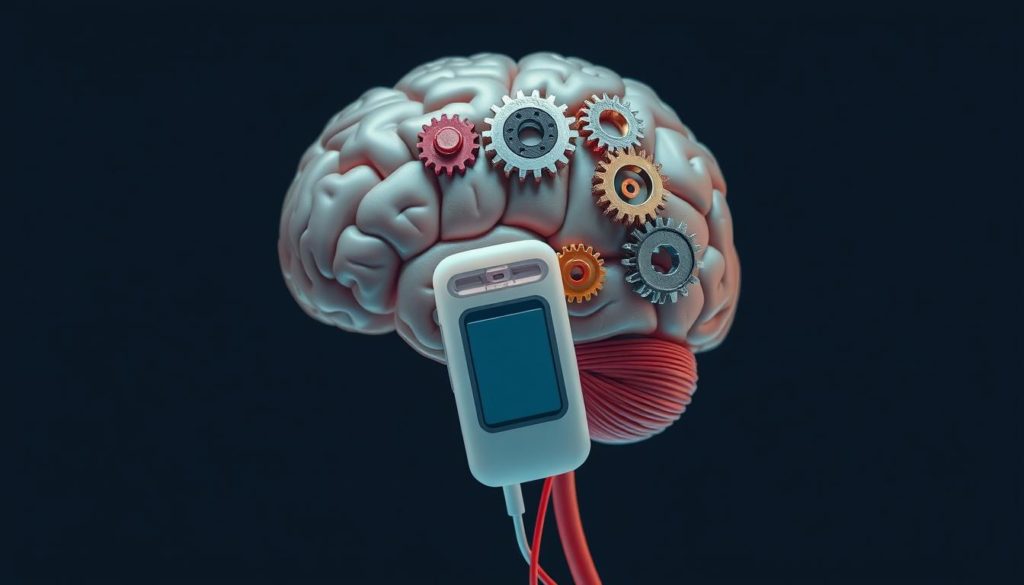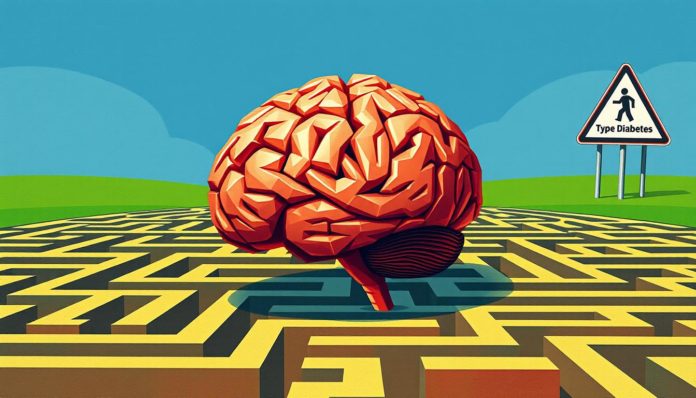Did you know that people with Type 1 Diabetes are at a higher risk? They are 2.5 times more likely to develop cognitive problems than others. This fact shows why it’s crucial to explore the link between Type 1 Diabetes and brain health.
Type 1 Diabetes is not just an issue with insulin production by the pancreas. Studies show a strong link between this condition and brain function. It affects memory, focus, and how fast we process information. Taking care of Type 1 Diabetes means more than just watching blood sugar. It’s also about protecting the brain.
T1D challenges like too low or high blood sugar can harm the brain over time. So, managing Type 1 Diabetes well is key. It’s important not just for the body but for mental function too.
For those with Type 1 Diabetes and their caregivers, knowing how blood sugar impacts the mind is critical. By managing it well, one can greatly reduce brain health risks.
Understanding Type 1 Diabetes and Brain Health Connection
The link between blood sugar levels and brain function in Type 1 Diabetes is being closely studied. Changes in blood sugar, like too low or too high, can harm how the brain works. This can lead to problems with memory, focusing, and making decisions.
Effects of Blood Sugar Levels on Cognitive Function
Keeping blood sugar stable is key for brain health. Changes in blood sugar can really affect our thinking. High blood sugar can harm the brain over time, and low blood sugar can make it hard to think clearly right away. So, controlling blood sugar is very important for people with Type 1 Diabetes.

Role of Insulin in Brain Function
Insulin is not just for controlling blood sugar. It also helps our brains work properly. It plays a part in how neurons communicate and how we think and learn. For people with Type 1 Diabetes, keeping insulin and blood sugar levels right is crucial for a healthy brain.
Key Components Affected by Blood Sugar Levels and Insulin
| Component | Impact of Blood Sugar | Impact of Insulin |
|---|---|---|
| Memory | Disruption due to both hyperglycemia and hypoglycemia | Enhanced performance when regulated, impairment if unbalanced |
| Attention | Compromised in fluctuating blood sugar levels | Influences attention span and concentration |
| Executive Function | Negatively affected by uncontrolled blood sugar | Vital for maintaining cognitive tasks and decision-making |
The Impact of Hypoglycemia on Brain Health
Hypoglycemia means dangerously low blood glucose levels. It can deeply affect brain health. For people with Type 1 Diabetes, low blood sugar episodes are common if they’re not careful with their sugar levels. This can mess with how the brain works, leading to cognitive issues.

Cognitive Symptoms of Severe Hypoglycemia
Severe hypoglycemia shows up in many cognitive symptoms, like:
- Confusion
- Difficulty concentrating
- Blurred vision
- Seizures
- Loss of consciousness
These symptoms of hypoglycemia are scary and can be dangerous. They show why it’s crucial to keep a close watch on blood sugar for brain health. Repeated low sugar episodes might cause permanent cognitive harm, highlighting the need for regular monitoring.
Knowing how hypoglycemia affects brain health is key for managing Type 1 Diabetes. Taking the right steps can lessen risks and help maintain good cognitive function.
Hyperglycemia and Its Long-Term Effects on the Brain
Those living with Type 1 Diabetes face many challenges, including chronic high blood sugar levels, known as hyperglycemia. This condition can lead to various complications of Type 1 Diabetes. It’s important to know hyperglycemia’s effects on the brain over time, as it can cause severe outcomes.
Association with Cognitive Decline
Studies show a strong link between hyperglycemia and cognitive decline. High blood sugar levels can create conditions that speed up cognitive issues. A major concern is the amyloid plaques that form, related to Alzheimer’s disease. These plaques link Type 1 Diabetes complications to neurodegenerative diseases.
Potential for Neurological Damage
The risk of neurological damage from hyperglycemia is serious. High glucose levels cause oxidative stress, which damages neurons over time. This leads to cognitive problems and long-term brain issues. So, preventing high blood sugar episodes is crucial for managing Type 1 Diabetes and protecting the brain.
| Impact | Outcome |
|---|---|
| Hyperglycemia Cognitive Decline | Accelerated decline, Alzheimer’s association |
| Hyperglycemia Neurological Damage | Oxidative stress, Neuronal damage |
Inflammation and Oxidative Stress in Type 1 Diabetes
Type 1 Diabetes can increase inflammation and oxidative stress in your body, which might harm brain health. This can create a bad environment for your brain, affecting memory and how blood flows in arteries. It’s crucial to keep these levels low for better brain function.
The Molecular Connection to Cognitive Impairment
Inflammation due to Type 1 Diabetes can mess with your brain functions through certain pathways. When too many free radicals harm brain cells, it can affect how you remember, learn, and think. This leads to worse cognitive abilities and overall brain health.
Managing Inflammation for Better Brain Health
It’s important to control inflammation for good brain health in Type 1 Diabetes. You can keep inflammation down with a diet full of antioxidants, staying active, and sometimes medicine. Following these tips not only fights inflammation but also boosts brain health and life quality.
Strategies for Maintaining Optimal Brain Health with Type 1 Diabetes
Maintaining a healthy brain with Type 1 Diabetes requires a well-rounded lifestyle. This includes eating right and staying active. These steps not only keep diabetes in check but also boost brain health.
Nutritional Tips for Brain Health
Eating foods rich in antioxidants and anti-inflammatory properties can improve brain health. It also fights oxidative stress. Here are essential brain health tips regarding nutrition:
- Antioxidant-rich foods: Include berries, citrus fruits, and dark leafy veggies for brain protection.
- Healthy fats: Omega-3s in fish and nuts aid brain function.
- Whole grains: Foods like quinoa and brown rice help balance blood sugar, important for Type 1 Diabetes management.
- Hydration: Drinking enough water is key for optimal brain operation.
Importance of Regular Physical Activity
Exercise is crucial for brain health and diabetes control. Here’s the impact of consistent exercise on physical activity and brain health:
- Improved blood flow: Working out boosts blood flow to the brain, nourishing it with essential nutrients and oxygen.
- Insulin sensitivity: Being active enhances insulin sensitivity, aiding in Type 1 Diabetes management.
- Mood enhancement: Exercise triggers endorphins, lifting mood and reducing stress.
- Cognitive function: Exercises like jogging, swimming, or yoga keep the mind sharp and lower the risk of decline.
Pairing these brain health tips with regular exercise lays a solid base for managing Type 1 Diabetes. It also supports overall mental well-being.
Cognitive Symptoms to Watch Out For in Type 1 Diabetes
People with Type 1 Diabetes need to watch out for specific cognitive symptoms. Spotting these Type 1 Diabetes cognitive symptoms early can really make a difference. These can include forgetting things, problem-solving trouble, being slow to process, and trouble staying focused.
Noticing these cognitive signs early is crucial. Early detection means timely help. By keeping an eye on these symptoms, you can keep your blood sugar in check and avoid cognitive decline. The link between Type 1 Diabetes and cognitive warning signs is strong, so being aware is crucial for your health.
- Memory Lapses: You might find yourself more forgetful or unable to remember recent events well.
- Problem-Solving Challenges: If planning or organizing gets tough, take notice.
- Slower Processing Speeds: Finding it hard to understand or react to new information can be a sign of cognitive pressure.
- Attention Difficulties: If you’re easily distracted or can’t focus, it might be a symptom.
Even though they might be slight at first, Type 1 Diabetes cognitive symptoms can greatly affect you over time. Keeping an eye on these symptoms and acting fast is crucial for staying sharp.
Role of Blood-Brain Barrier in Type 1 Diabetes
The blood-brain barrier (BBB) serves as a critical protector, shielding the brain from dangerous substances. But, Type 1 Diabetes (T1D) can damage this barrier. This can lead to brain health issues.
How Type 1 Diabetes Affects the Blood-Brain Barrier
Type 1 Diabetes can greatly affect the BBB, starting a series of problems. High blood sugar causes oxidative stress, making the BBB weaker. This lets harmful substances enter the brain.
When this happens, inflammation may occur, affecting brain functions.
Strategies to Protect the Blood-Brain Barrier
For people with T1D, it’s crucial to protect the BBB to keep the brain healthy. Here are important strategies:
- Stringent Blood Glucose Control: Keeping blood sugar at the right levels can guard against BBB damage.
- Use of Antioxidants: Adding antioxidants to your diet can counter oxidative stress, keeping the BBB strong.
- Managing Associated Risk Factors: Taking care of issues like high blood pressure helps ease the BBB’s load.
These methods help safeguard the BBB, supporting cerebral wellness in those with T1D.
Managing Blood Sugar Levels for Better Cognitive Function
Keeping blood sugar levels in check is key for people with Type 1 Diabetes (T1D) who want to keep their brain sharp. It’s not just about stopping the immediate risks of too low or too high sugar levels. It’s crucial for long-term brain wellness too. That’s why focusing on blood sugar management is vital for anyone with T1D.
Checking blood sugar often is a main step in managing T1D. This helps people act fast and correctly to keep sugar levels stable. Using insulin right and on time is also crucial to manage diabetes well. It helps keep sugar levels in the right range.
Eating well and staying active are important for brain and blood sugar health. A diet full of fiber, lean proteins, and good fats helps keep sugar levels steady. Being active helps control glucose and improves brain function. So, a mix of good food, exercise, and close monitoring helps people with Type 1 Diabetes stay sharp.
FAQ
Can Type 1 Diabetes affect brain health?
Yes, it can affect your brain health a lot. Changes in blood sugar can make it hard to think, remember, and focus.
How do blood sugar levels impact cognitive function in Type 1 Diabetes?
Blood sugar highs and lows impact how well you think. Low levels can cause confusion and trouble focusing. High levels over time can hurt your brain function.
What role does insulin play in brain function?
Insulin is key not just for blood sugar but also for your brain. It helps in thinking and messaging in the brain. So, disruptions in insulin with Type 1 Diabetes can affect your brain health.
What are the cognitive symptoms of severe hypoglycemia?
Severe low blood sugar can make you confused, unable to focus, and have blurry vision. In serious cases, it can cause seizures or make you pass out. If it happens often, it can lead to long-term brain issues.
How is hyperglycemia linked to cognitive decline?
High blood sugar over time can harm your thinking abilities. It can also cause plaques in your brain and more stress to your cells, which can damage your neurons.
What is the relationship between inflammation, oxidative stress, and cognitive impairment in Type 1 Diabetes?
Type 1 Diabetes can increase inflammation and stress in your body which affects your brain too. This can harm your thinking processes and neuron health.
What are some nutritional tips for maintaining brain health with Type 1 Diabetes?
Eating foods with lots of antioxidants and anti-inflammatory properties helps your brain. Go for berries, nuts, veggies, and fatty fish.
Why is regular physical activity important for brain health in people with Type 1 Diabetes?
Staying active boosts blood flow to your brain and helps with insulin sensitivity. It’s key for a healthy brain and lowering the risk of thinking problems.
What cognitive symptoms should individuals with Type 1 Diabetes watch out for?
Watch for forgetfulness, trouble solving problems, slow thinking, and attention issues. Identifying these early is important for getting help quick.
How does Type 1 Diabetes affect the blood-brain barrier (BBB)?
It can weaken the BBB, which could lead to neurological problems. Keeping your blood sugar under control, eating antioxidants, and managing high blood pressure can protect the BBB.
What strategies can help manage blood sugar levels for better cognitive function?
Keeping blood sugar stable is key. This means testing your blood sugar often, sticking to your insulin schedule, eating right, and staying active. This helps prevent thinking issues and protects your brain long-term.


